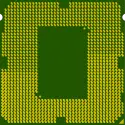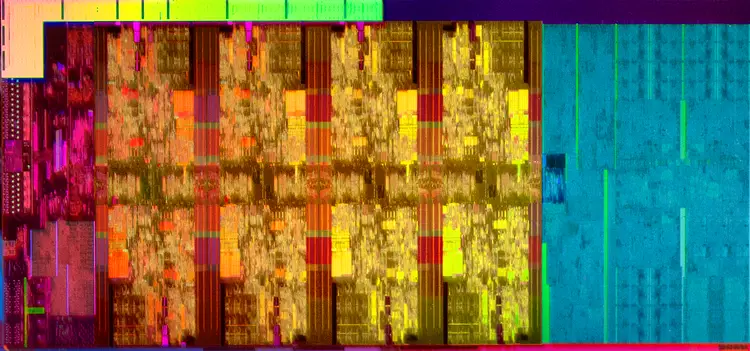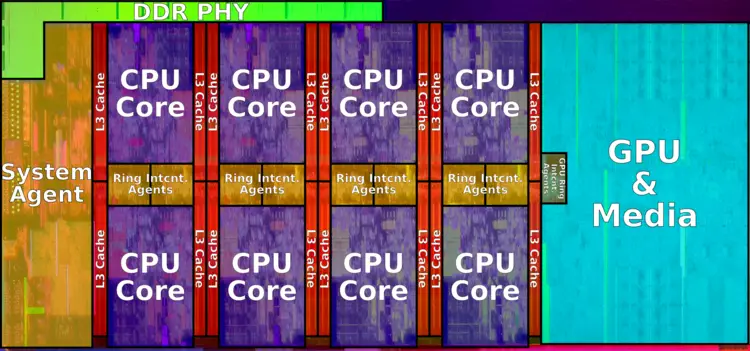From WikiChip
Difference between revisions of "intel/core i7/i7-9700kf"
(max memory size corrected, ref: https://ark.intel.com/content/www/us/en/ark/products/190885/intel-core-i7-9700kf-processor-12m-cache-up-to-4-90-ghz.html) |
|||
| Line 36: | Line 36: | ||
|thread count=8 | |thread count=8 | ||
|max cpus=1 | |max cpus=1 | ||
| − | |max memory= | + | |max memory=128 GiB |
|tdp=95 W | |tdp=95 W | ||
|tjunc min=0 °C | |tjunc min=0 °C | ||
| Line 44: | Line 44: | ||
|package module 1={{packages/intel/fclga-1151}} | |package module 1={{packages/intel/fclga-1151}} | ||
}} | }} | ||
| − | '''Core i7-9700KF''' is a {{arch|64}} [[octa-core]] high-end performance [[x86]] desktop microprocessor introduced by [[Intel]] in early [[2019]]. This processor, which is based on the {{intel|Coffee Lake|l=arch}} microarchitecture, is manufactured on Intel's 3rd generation enhanced [[14 nm process|14nm++ process]]. The i7-9700KF operates at a 3.6 GHz with a [[TDP]] of 95 W and a {{intel|Turbo Boost}} frequency of up to 4.9 GHz. This chip supports up to | + | '''Core i7-9700KF''' is a {{arch|64}} [[octa-core]] high-end performance [[x86]] desktop microprocessor introduced by [[Intel]] in early [[2019]]. This processor, which is based on the {{intel|Coffee Lake|l=arch}} microarchitecture, is manufactured on Intel's 3rd generation enhanced [[14 nm process|14nm++ process]]. The i7-9700KF operates at a 3.6 GHz with a [[TDP]] of 95 W and a {{intel|Turbo Boost}} frequency of up to 4.9 GHz. This chip supports up to 128 GiB of dual-channel DDR4-2666 memory. |
This is model is identical to the {{\\|i7-9700K}} except it comes without integrated graphics. | This is model is identical to the {{\\|i7-9700K}} except it comes without integrated graphics. | ||
| Line 73: | Line 73: | ||
|type=DDR4-2666 | |type=DDR4-2666 | ||
|ecc=No | |ecc=No | ||
| − | |max mem= | + | |max mem=128 GiB |
|controllers=1 | |controllers=1 | ||
|channels=2 | |channels=2 | ||
Revision as of 16:08, 18 April 2020
| Edit Values | ||||||||||||
| Core i7-9700KF | ||||||||||||
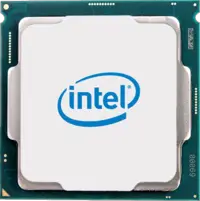 | ||||||||||||
| General Info | ||||||||||||
| Designer | Intel | |||||||||||
| Manufacturer | Intel | |||||||||||
| Model Number | i7-9700KF | |||||||||||
| Part Number | BX80684I79700KF | |||||||||||
| S-Spec | SRFAC | |||||||||||
| Market | Desktop | |||||||||||
| Introduction | January 7, 2019 (announced) January 7, 2019 (launched) | |||||||||||
| Release Price | $374.00 (tray) | |||||||||||
| Shop | Amazon | |||||||||||
| General Specs | ||||||||||||
| Family | Core i7 | |||||||||||
| Series | i7-9000 | |||||||||||
| Locked | No | |||||||||||
| Frequency | 3,600 MHz | |||||||||||
| Turbo Frequency | 4,900 MHz (1 core) | |||||||||||
| Bus type | DMI 3.0 | |||||||||||
| Bus rate | 4 × 8 GT/s | |||||||||||
| Clock multiplier | 36 | |||||||||||
| Microarchitecture | ||||||||||||
| ISA | x86-64 (x86) | |||||||||||
| Microarchitecture | Coffee Lake | |||||||||||
| Platform | Coffee Lake | |||||||||||
| Chipset | 300 series | |||||||||||
| Core Name | Coffee Lake R | |||||||||||
| Core Family | 6 | |||||||||||
| Core Model | 158 | |||||||||||
| Core Stepping | P0 | |||||||||||
| Process | 14 nm | |||||||||||
| Technology | CMOS | |||||||||||
| Word Size | 64 bit | |||||||||||
| Cores | 8 | |||||||||||
| Threads | 8 | |||||||||||
| Max Memory | 128 GiB | |||||||||||
| Multiprocessing | ||||||||||||
| Max SMP | 1-Way (Uniprocessor) | |||||||||||
| Electrical | ||||||||||||
| TDP | 95 W | |||||||||||
| Tjunction | 0 °C – 100 °C | |||||||||||
| Tstorage | -25 °C – 125 °C | |||||||||||
| Packaging | ||||||||||||
| ||||||||||||
Core i7-9700KF is a 64-bit octa-core high-end performance x86 desktop microprocessor introduced by Intel in early 2019. This processor, which is based on the Coffee Lake microarchitecture, is manufactured on Intel's 3rd generation enhanced 14nm++ process. The i7-9700KF operates at a 3.6 GHz with a TDP of 95 W and a Turbo Boost frequency of up to 4.9 GHz. This chip supports up to 128 GiB of dual-channel DDR4-2666 memory.
This is model is identical to the i7-9700K except it comes without integrated graphics.
Contents
Cache
- Main article: Coffee Lake § Cache
|
Cache Organization
Cache is a hardware component containing a relatively small and extremely fast memory designed to speed up the performance of a CPU by preparing ahead of time the data it needs to read from a relatively slower medium such as main memory. The organization and amount of cache can have a large impact on the performance, power consumption, die size, and consequently cost of the IC. Cache is specified by its size, number of sets, associativity, block size, sub-block size, and fetch and write-back policies. Note: All units are in kibibytes and mebibytes. |
|||||||||||||||||||||||||||||||||||||
|
|||||||||||||||||||||||||||||||||||||
Memory controller
|
Integrated Memory Controller
|
||||||||||||||
|
||||||||||||||
Expansions
Expansion Options |
|||||
|
|||||
Graphics
This microprocessor does not have integrated graphics.
Features
[Edit/Modify Supported Features]
Frequencies
- See also: Intel's CPU Frequency Behavior
| Mode | Base | Turbo Frequency/Active Cores | |||||||
|---|---|---|---|---|---|---|---|---|---|
| 1 | 2 | 3 | 4 | 5 | 6 | 7 | 8 | ||
| Normal | 3,600 MHz | 4,900 MHz | 4,800 MHz | 4,700 MHz | 4,700 MHz | 4,600 MHz | 4,600 MHz | 4,600 MHz | 4,600 MHz |
Die
- See also: Coffee Lake § Die
A die shot of Intel's Coffee Lake octa-core desktop processors:
Documents
Facts about "Core i7-9700KF - Intel"
| Has subobject "Has subobject" is a predefined property representing a container construct and is provided by Semantic MediaWiki. | Core i7-9700KF - Intel#package + and Core i7-9700KF - Intel#pcie + |
| base frequency | 3,600 MHz (3.6 GHz, 3,600,000 kHz) + |
| bus links | 4 + |
| bus rate | 8,000 MT/s (8 GT/s, 8,000,000 kT/s) + |
| bus type | DMI 3.0 + |
| chipset | 300 series + |
| clock multiplier | 36 + |
| core count | 8 + |
| core family | 6 + |
| core model | 158 + |
| core name | Coffee Lake R + |
| core stepping | P0 + |
| designer | Intel + |
| family | Core i7 + |
| first announced | January 7, 2019 + |
| first launched | January 7, 2019 + |
| full page name | intel/core i7/i7-9700kf + |
| has advanced vector extensions | true + |
| has advanced vector extensions 2 | true + |
| has ecc memory support | false + |
| has extended page tables support | true + |
| has feature | Advanced Vector Extensions +, Advanced Vector Extensions 2 +, Advanced Encryption Standard Instruction Set Extension +, Turbo Boost Technology 2.0 +, Enhanced SpeedStep Technology +, Trusted Execution Technology +, Intel vPro Technology +, Intel VT-x +, Intel VT-d +, Extended Page Tables +, Transactional Synchronization Extensions +, Memory Protection Extensions +, Software Guard Extensions +, Secure Key Technology +, OS Guard +, Stable Image Platform Program + and Identity Protection Technology + |
| has intel enhanced speedstep technology | true + |
| has intel identity protection technology support | true + |
| has intel secure key technology | true + |
| has intel stable image platform program support | true + |
| has intel supervisor mode execution protection | true + |
| has intel trusted execution technology | true + |
| has intel turbo boost technology 2 0 | true + |
| has intel vpro technology | true + |
| has intel vt-d technology | true + |
| has intel vt-x technology | true + |
| has locked clock multiplier | false + |
| has second level address translation support | true + |
| has transactional synchronization extensions | true + |
| has x86 advanced encryption standard instruction set extension | true + |
| instance of | microprocessor + |
| isa | x86-64 + |
| isa family | x86 + |
| l1$ size | 512 KiB (524,288 B, 0.5 MiB) + |
| l1d$ description | 8-way set associative + |
| l1d$ size | 256 KiB (262,144 B, 0.25 MiB) + |
| l1i$ description | 8-way set associative + |
| l1i$ size | 256 KiB (262,144 B, 0.25 MiB) + |
| l2$ description | 4-way set associative + |
| l2$ size | 2 MiB (2,048 KiB, 2,097,152 B, 0.00195 GiB) + |
| l3$ description | 12-way set associative + |
| l3$ size | 12 MiB (12,288 KiB, 12,582,912 B, 0.0117 GiB) + |
| ldate | January 7, 2019 + |
| main image | 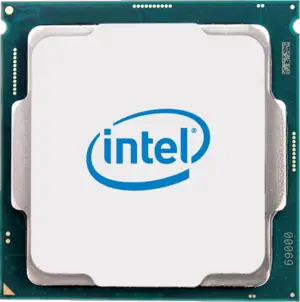 + + |
| manufacturer | Intel + |
| market segment | Desktop + |
| max cpu count | 1 + |
| max junction temperature | 373.15 K (100 °C, 212 °F, 671.67 °R) + |
| max memory | 131,072 MiB (134,217,728 KiB, 137,438,953,472 B, 128 GiB, 0.125 TiB) + |
| max memory bandwidth | 39.74 GiB/s (40,693.76 MiB/s, 42.671 GB/s, 42,670.5 MB/s, 0.0388 TiB/s, 0.0427 TB/s) + |
| max memory channels | 2 + |
| max storage temperature | 398.15 K (125 °C, 257 °F, 716.67 °R) + |
| microarchitecture | Coffee Lake + |
| min junction temperature | 273.15 K (0 °C, 32 °F, 491.67 °R) + |
| min storage temperature | 248.15 K (-25 °C, -13 °F, 446.67 °R) + |
| model number | i7-9700KF + |
| name | Core i7-9700KF + |
| package | FCLGA-1151 + |
| part number | BX80684I79700KF + |
| platform | Coffee Lake + |
| process | 14 nm (0.014 μm, 1.4e-5 mm) + |
| release price | $ 374.00 (€ 336.60, £ 302.94, ¥ 38,645.42) + |
| release price (tray) | $ 374.00 (€ 336.60, £ 302.94, ¥ 38,645.42) + |
| s-spec | SRFAC + |
| series | i7-9000 + |
| smp max ways | 1 + |
| socket | LGA-1151 + |
| supported memory type | DDR4-2666 + |
| tdp | 95 W (95,000 mW, 0.127 hp, 0.095 kW) + |
| technology | CMOS + |
| thread count | 8 + |
| turbo frequency (1 core) | 4,900 MHz (4.9 GHz, 4,900,000 kHz) + |
| word size | 64 bit (8 octets, 16 nibbles) + |
| x86/has memory protection extensions | true + |
| x86/has software guard extensions | true + |
